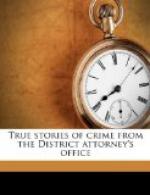On these facts, which did not seem to admit of contradiction, Recorder Goff ordered an oral examination of all the witnesses, the hearing of which, sandwiched in between the current trials in his court, dragged along for months, but which finally resulted in establishing to the Court’s satisfaction that the violin discovered in the possession of the Springers was the genuine “Duke of Cambridge,” and that it could not have been in Flechter’s possession at the time he was arrested.
On July 7, 1902, eight years after Bott’s death and the arrest and indictment of Flechter for the theft of the violin, a picturesque group assembled in the General Sessions. There was Flechter and his lawyer, Mrs. Springer and her son, the attorneys for the prosecution, and lastly old Mrs. Bott. The seals of the case were broken and the violin identified by the widow as that of her husband. The Springers waived all claim to the violin, and the Court dismissed the indictment against the defendant and ordered the Stradivarius to be delivered to Mrs. Bott, with these words:
“Mrs. Bott, it affords very great pleasure to the Court to give the violin to you. You have suffered many years of sorrow and trouble in regard to it.”
“Eight years,” sighed the old lady, clasping the violin in her arms.
“I wish you a great deal of pleasure in its possession,” continued the Recorder.
Thus ended, as a matter of record, the case of The People against Flechter. For eight years the violin dealer and his family had endured the agony of disgrace, he had spent a fortune in his defense, and had nevertheless been convicted of a crime of which he was at last proved innocent.
Yet, there are those who, when the case is mentioned, shake their heads wisely, as if to say that the whole story of the lost Stradivarius has never been told.
IV
The Last of the Wire-Tappers
“Sir,” replied
the knave unabashed, “I am one of those who do
make a
living by their wits.”
John Felix, a dealer in automatic musical instruments in New York City, was swindled out of $50,000 on February 2d, 1905, by what is commonly known as the “wire-tapping” game. During the previous August a man calling himself by the name of Nelson had hired Room 46, in a building at 27 East Twenty-second Street, as a school for “wireless telegraphy.” Later on he had installed over a dozen deal tables, each fitted with a complete set of ordinary telegraph instruments and connected with wires which, while apparently passing out of the windows, in reality plunged behind a desk into a small “dry” battery. Each table was fitted with a shaded electric drop-light, and the room was furnished with the ordinary paraphernalia of a telegraph office. The janitor never observed any activity in the “school.” There seemed to be no pupils, and no one haunted the place except a short, ill-favored person who appeared monthly and paid the rent.




